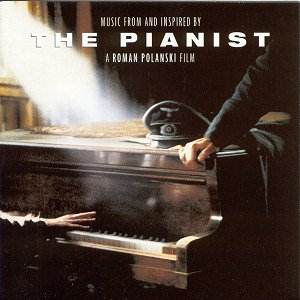The music of the film Ė The Pianist, directed
by Roman Polanski. The subject is Wladislaw Szpilman, a pianist, who
takes refuge in a Warsaw Ghetto during World War II having avoided being
shipped to a death camp thanks to the aid of a music-loving SS officer.
As I understand it! I havenít seen the film, nor are there any notes
in the CDís booklet, which is though graced by several stills from the
film. I must presume that given the CD has at least 20 minutes more
playing time available that all the music featured in the film is included.
Of the nine pieces by Chopin, Janusz Olejniczak plays eight. Of these,
three are newly recorded in 2001, four are from 1991 and the Prelude
is from 1994. On what might be considered a bonus track, Wladislaw Szpilman
himself recorded the Mazurka in 1948.
The three nocturnes open the CD. They flow and are
spontaneous; Janusz Olejniczak plays with mellow tone and concentrated
expression. However, as one listens further, his sound and expressive
palette becomes somewhat limited. While he commands a wide dynamic range
and an unforced fortissimo (try the climax of the C minor Nocturne),
I was neither wholly absorbed nor totally convinced once past the engaging
without-opus-number C sharp minor nocturne. In short his is good if
limited playing.
I am left to suggest that this CD is a souvenir for
those who see the film and like the music. In this respect it is a perfectly
fine release, and people buying it thus wonít be disappointed or worry
about the mingling of different-year recordings that betray slightly
higher hiss levels in the earlier takes, the tape endings of which are
rather precipitated in their splicing. Nor will it be of paramount concern
that Olejniczak, while a sensitive player, one who has Chopinís music
in his fingers if not always his soul, proves too volatile an interpreter.
For example, the way he takes off a couple of minutes into the F major
Ballade is too contrasting; other such diversions mark Olejniczak as
a sectional Chopin interpreter Ė hereís one mood, now another, the whole
seems less important. He is also too percussive. I donít doubt the passion,
although Iím not sure this music communicates as it intrinsically might
when bravura and demonstration are as nakedly detailed as here.
Thereís a similar head-banging start to the G minor
Ballade, the most popular of the four, before a welcome yielding to
introspection. Even so, there is a note for note realisation that while
far from being literal also leaves the door open for something altogether
more illuminating and identified; itís an entrance Olejniczak doesnít
go into. Overall, his agenda is more assault and battery than poise
and growth. Fans of Kissin might like it! The waltz could be more seductive,
the prelude more suggestive of latent melancholy, and the Andante spianato
is too lumpy and perfunctory for the calm lake that this music should
be. The orchestra enter for the Polonaise, its textures inflated by
too cavernous an acoustic (the same one that is unhelpful to José
Curaís new recording of Rachmaninovís Second Symphony).
Track 10 is Kilarís two-minute piece, written for the
film presumably, that is a slinky and doleful example of Klezmer-tinged
music, here for clarinet and strings, its diminuendo close produced
it seems by the control room rather than the players.
Finally to the single example of Szpilmanís own playing.
The sound is somewhat primitive but no barrier to enjoying playing that
has an emotional interior that finds the soul and shape of this archetype
of Chopinís most elusive oeuvre. A CD, then, for the souvenir-hunter.
With the exception of Szpilmanís four-minute appearance, I donít think
serious collectors need be troubled.
Colin Anderson

![]() Janusz Olejniczak
(piano)
Janusz Olejniczak
(piano) ![]() SONY SK 87739 [58í30"]
SONY SK 87739 [58í30"]